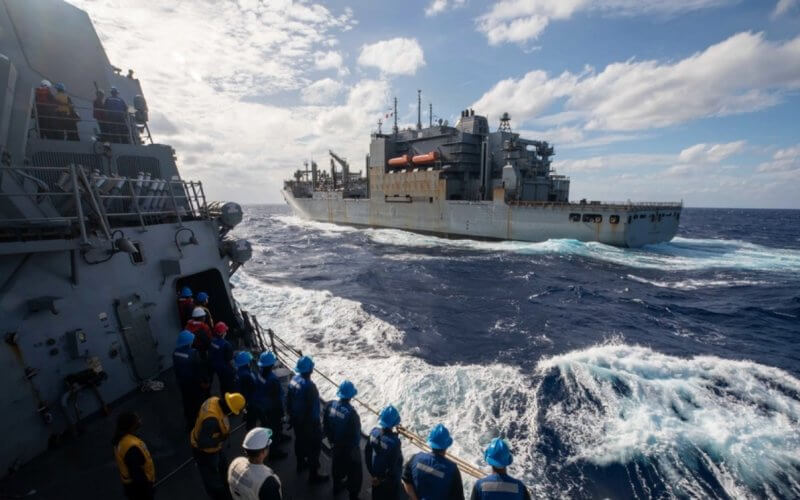By: Micaela Burrow, Daily Caller News Foundation
Operation Prosperity Guardian, the multinational task force the Pentagon announced Dec. 18 to safeguard shipping against attacks from Houthi rebels in the Red Sea, is failing, experts told the Daily Caller News Foundation.
Increasingly, the administration is approaching a point where it can no longer countenance enduring the constant drone and missile barrages from the Iran-backed Houthi rebels that have spooked shipping companies and handcuffed shipping through the critical sea lane, experts told the DCNF. However, Houthi attacks and hijacking attempts will likely continue until the war in Gaza ends or the U.S. engages in counteroffensive strikes.
“It is not affecting the Houthis as they continue their attacks unabated,” Brent Sadler, a senior research fellow for naval warfare and advanced technology at the Heritage Foundation, told the DCNF, referring to Operation Prosperity Guardian. “And, shipping is still being interfered with on a growing scale.”
The Houthis have conducted 24 attacks on international shipping, according to CENTCOM. In the latest on Jan. 2, the U.S. said three ballistic missiles splashed into the waters near several commercial ships but did not cause any damage.
“What exactly has the task force accomplished? There have not been clear steps toward deterrence, and nothing has changed in the Red Sea. Houthi aggression continues,” Senate Armed Services Committee ranking member Roger Wicker said, responding to the news on social media.
The Pentagon said Operation Prosperity Guardian was meant as a “defensive” task force aimed at reassuring commercial shipping companies their cargo would safely transit through the Red Sea. Many are set to pass through the Suez Canal, while others are destined for ports in Saudi Arabia or southern Israel.
“Operation Prosperity Guardian was established to enhance the deterrence presence in the Red Sea and to respond to and assist commercial vessels that are transiting this vital international waterway. It’s a defensive coalition meant to reassure global shipping mariners that the international community is there to help with safe passage,” a defense spokesperson told the DCNF.
The operation ran into hiccups from the start.
Italy and Spain, initially included as partners in the U.S.-led defensive coalition, appeared to distance themselves from the operation in statements, while nearly half of participants — likely Arab countries — refused to publicly acknowledge their contribution, Reuters reported. France’s Defense Ministry said on Dec. 19 it would keep its frigate Languedoc, which had already downed a Houthi drone, in the region, but would not submit its ships to American command in a statement.
And since the announcement, the U.S. has borne the brunt of the burden, shooting down ballistic missiles and attack drones aiming at both the American warships and commercial vessels. Coalition vessels have also provided limited escorts for commercial ships.
U.S. military assets in the Red Sea now include 130 aircraft and the vessels assigned to the USS Dwight D. Eisenhower Carrier Strike Group, carrying about 4,000 sailors and Marines, White House national security spokesperson John Kirby said at a briefing Wednesday.
“As the president has made clear, the United States does not seek conflict with any nation or actor in the Middle East, nor do we want to see the war between Israel and Hamas widen in the region,” Kirby said. “But neither will we shrink from the task of defending ourselves, our interests, our partners, or the free flow of international commerce.”
As for what has changed since the coalition formally announced, Sadler said he’s observed “nothing that is noticeable.”
Also notable is the lack of a “clear new diplomatic effort backing it up either,” he added. Partners have not coordinated on sanctions against the Houthis and their financing networks either.
Shipping giant Maersk extended a pause on transits in the Red Sea just days after announcing preparations to resume operations. The change in outlook came after the Houthis attacked the Singapore-flagged, Denmark-owned and operated Maersk Hangzou twice in the span of a day, ending in a firefight between Houthis on four small boats and an embarked contract security team shooting alongside U.S. military helicopters that resulted in ten attackers killed.
Shipping rates have skyrocketed and deliveries delayed, Reuters reported, citing Freightos. The cost to send a 40-foot container on the Asia-to-North Europe route doubled to $4,000, and the Asia-to-Mediterranean transit could reach as high as $6,000 while carriers have added per-container surcharges ranging from $500 to $2,700.
Rates for shipments to America’s east and west coasts have also more than doubled.
Suez Canal transits fell off 70% in the last week of December, according to data from Goldman shared by Marhelm, a shipping and trade analysis group. More than 180 container ships and other vessels have rerouted through the Cape of Good Hope as of Wednesday, according to Reuters. Trackers show nearly all box ships avoiding the Red Sea, opting instead for the long journey around southern Africa.
Prosperity Guardian is hindered by an “unclear operational approach to a common strategic goal that the members of the [coalition] can agree to” and self-imposed proscriptions around use of force against the Houthis, such as strikes against launch sites in Houthi-controlled areas of Yemen, Sadler said.
The Biden administration is anxious to avoid targeting the Houthis directly for a number of reasons that include hesitance to disrupt hard-won peace talks with the rebel group and the Saudi-backed government of Yemen, Michael Knights, a senior fellow at the Washington Institute for Near East Policy, told the DCNF. However, it may not have a choice.
The U.S. and partners, including Australia, Bahrain, Belgium, Canada, Denmark, Germany, Italy, Japan, the Netherlands, New Zealand and the United Kingdom, issued a strongly-worded statement warning the Houthis of unspecified “consequences” for their actions in the Red Sea on Wednesday, hinting at possible retaliation. The militants’ actions are “illegal, unacceptable, and profoundly destabilizing,” the statement read.
“This statement is a desperate plea for the Houthis to not wreck the peace process and force the U.S. to strike them onshore. That moment is coming close, unless the U.S.. can think of creative covert ways to inflict pain on Houthi leaders,” Knights told the DCNF.
Biden administration national security leaders met Wednesday to flesh out military options for responding to the Houthi attacks, but the president has not yet approved any, NBC News reported, citing officials.
However, the Houthis are not likely to stop their attacks until “real costs” are imposed on the rebels, Sadler said.
“The Gaza war will end eventually, and the Houthis will probably stop then,” Knights said.
Related Story: U.S. Navy Downs Three Ballistic Missiles, Two Cruise Missiles and a Dozen Drones Fired by the Houthis










